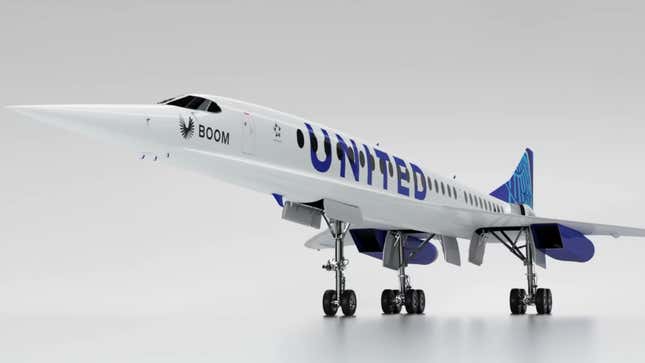
United Airlines has agreed to purchase 15 jets that fly faster than the speed of sound from Boom Supersonic, with options to purchase 35 more. The purchase means United is on track to reintroduce the first commercial supersonic flights since the retirement of the Aérospatiale/BAC Concorde in 2003.
The return of supersonic jets is a boon for people wealthy enough to afford tickets on them. But air travel is harmful to the planet, with a 2020 study in Atmospheric Environment finding it amounted to 3.5% of all global warming currently caused by humans. Business- and first-class are the worst culprits. Perhaps in an attempt to get ahead of criticism, United said that when Boom jets roll out of factories in 2025 and hit the skies in 2026, they’re “expected to be the first large commercial aircraft to be net-zero carbon from day one, optimized to run on 100% sustainable aviation fuel.”
“The world’s first purchase agreement for net-zero carbon supersonic aircraft marks a significant step toward our mission to create a more accessible world,” Boom Supersonic founder and CEO Blake Scholl said in the release. “United and Boom share a common purpose—to unite the world safely and sustainably. At speeds twice as fast, United passengers will experience all the advantages of life lived in person, from deeper, more productive business relationships to longer, more relaxing vacations to far-off destinations.”
Does this sound too good to be true? That’s because it probably is.
Boom Supersonic advertises itself as an environmentally conscientious manufacturer. One of its high-profile partners for zero-emissions aviation fuel, Prometheus Fuels, has a flashy website advertising their Titan Fuel Forge. The startup says uses electricity to make fuel out of literal air by extracting carbon dioxide from the atmosphere and hydrogen from water, converting it to gasoline, diesel, and jet fuel (releasing harmless oxygen in the process). A single forge is reputedly capable of converting 9 kilotons of atmospheric carbon dioxide into 1 million gallons of fuel that is “molecularly identical” to that created by digging it up and refining it through far dirtier processes. When the process is entirely powered by renewable energy, that essentially means new fuel can be created and burned without pumping any new carbon dioxide into the skies, at least disregarding other material and operating costs.
But there’s a key caveat here: While the technology sounds impressive, Prometheus is still in the middle of refining and scaling up its processes. As of 2019, the efficiency of converting electricity into fuel via its process remained low. Founder Rob McGinnis estimated a single optimized forge could produce 20 liters of gasoline a week, and the company was only preparing to build a shipping container-sized factory that could produce hundreds of thousands of liters annually. For comparison, passenger jet fuel tanks usually have a maximum capacity in the tens of thousands of liters. Meanwhile, United’s entire fuel use in 2019 was 4.3 billion gallons. It doesn’t seem likely Prometheus will be fueling United’s entire fleet of Boom Overture jets anytime soon, let alone making a dent in United’s massive fuel (and carbon) footprint.
The announcement doesn’t actually say the jets will run on sustainable fuel, just that they’re “optimized” for it. Perhaps United plans on using other types of so-called sustainable fuels such as biofuel, which remains rare in aviation. Whether existing biofuels are truly carbon neutral remains a key area of contention, and truly helpful technologies like converting food waste that would otherwise go to landfills into aviation fuel remain in the experimental, not commercial, phases.
As Ars Technica noted, the Concorde consumed fuel at 11 times the rate of fuel of contemporary 747s to move similar payloads the same distance. Meanwhile, Boom’s CEO has only said that its Overture planes, which have just 65 to 88 seats, will have “overall fuel burn at parity” with other business-class travel. That’s vague enough to mean lots of things; the fuel economy for business class travel is far worse than that for other passengers.
The International Council on Clean Transportation estimated in 2018 that Overture jets could burn about five times as much fuel per passenger than a regular economy seat, though it noted numerous factors remained unknown about what the final craft will look like. In other words, without the sustainable fuel, Boom’s supersonic jets will be just as unsustainable as other business class-only ventures.
“There is no other human activity that contributes to such significant amounts of emissions in such a short period of time,” Stefan Gössling, a professor of tourism research at the Western Norway Research Institute, told Earther last year. “Essentially, on a 10-hour flight in business class, you will emit more than the average human within a year.”
That leaves carbon offsets, which are conspicuously named in the United Airlines announcement. Carbon offsets are when a polluter simply foots the bill for someone else to reduce their carbon emissions, whether it’s reforestation projects or installing more renewable energy. Absent a huge ramp up in sustainable fuel production in the next decade, offsets could easily comprise the vast majority of United’s plan to achieve zero emissions for the Overture fleet. United currently lets passengers buy offsets for flights, and they fund projects by Conservation International.
But as with Lyft’s commitment to carbon neutrality in 2018 or Occidental Petroleum recently declaring it was producing “carbon neutral oil,” offsets can amount to little more than placebos masking how much carbon a company is actually pumping into the atmosphere. A growing wave of studies and analyses looking at forestry offset programs have also found huge flaws, and in some cases, the projects have led to an increase in emissions.
Earther reached out to United for more detail on how it plans to achieve its supersonic net-zero goal on day one. We’ll update this piece if we hear back.